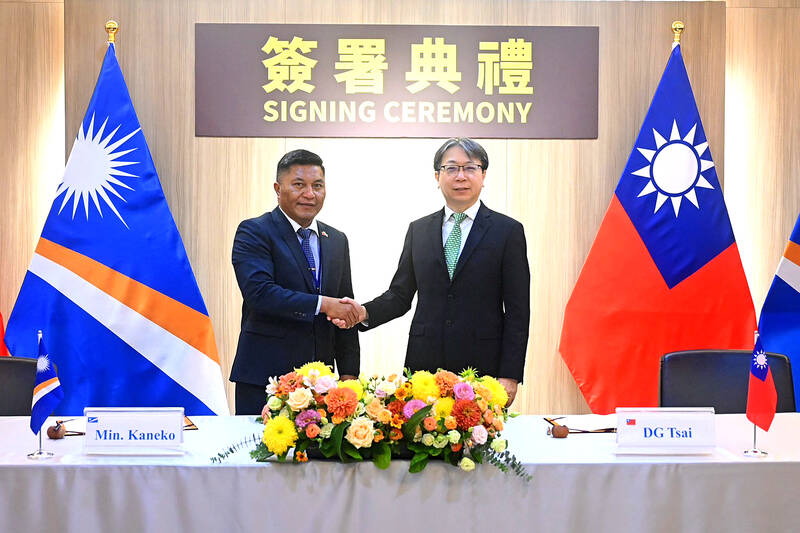National Security Bureau (NSB) Director-General Tsai Ming-yen (蔡明彥) and Marshallese Minister of Foreign Affairs and Trade Kalani Kaneko yesterday signed a letter of intent on security cooperation.
The letter is aimed at strengthening the security partnership between Taiwan and the Marshall Islands, the bureau said in a statement.
A Marshallese delegation, led by Marshallese President Hilda Heine, is visiting Taiwan from Monday to Saturday.

Photo: CNA
During Tsai’s security inspection ahead of President William Lai’s (賴清德) visit to the Marshall Islands in November last year, Heine said that the Marshall Islands established its National Security Office “in response to external maritime threats and infiltration into the country,” the bureau said.
Heine proposed that the two nations sign a letter of intent to expand cooperation in maritime awareness, cybersecurity and countering foreign malign influence, “to enhance the overall security capacity of the Marshall Islands,” it said.
The bureau said that China has attempted “to influence political situations in the South Pacific through cyberintrusions and the spread of disinformation” in recent years.
Concerned about threats China poses to its allies, Taiwan is cooperating with the Marshall Islands and other nations to “enhance cybersecurity defense capabilities and counter China’s cognitive warfare,” it said.
Heine designated Kaneko to represent the Marshall Islands in signing the letter of intent, which marks “a new chapter in Taiwan-Marshall Islands security cooperation,” the bureau said.
Both sides would cooperate on a wide range of initiatives, from intelligence sharing to capacity-building programs, striving to safeguard regional security and stability and counter threats posed by external hostile forces, it said.
Ambassador to the Marshall Islands Steve Hsia (夏季昌), Marshallese Minister of Education Joe Bejang and Marshallese Ministry of Foreign Affairs and Trade Secretary Isabela Silk also attended the signing ceremony.

Alain Robert, known as the "French Spider-Man," praised Alex Honnold as exceptionally well-prepared after the US climber completed a free solo ascent of Taipei 101 yesterday. Robert said Honnold's ascent of the 508m-tall skyscraper in just more than one-and-a-half hours without using safety ropes or equipment was a remarkable achievement. "This is my life," he said in an interview conducted in French, adding that he liked the feeling of being "on the edge of danger." The 63-year-old Frenchman climbed Taipei 101 using ropes in December 2004, taking about four hours to reach the top. On a one-to-10 scale of difficulty, Robert said Taipei 101

Nipah virus infection is to be officially listed as a category 5 notifiable infectious disease in Taiwan in March, while clinical treatment guidelines are being formulated, the Centers for Disease Control (CDC) said yesterday. With Nipah infections being reported in other countries and considering its relatively high fatality rate, the centers on Jan. 16 announced that it would be listed as a notifiable infectious disease to bolster the nation’s systematic early warning system and increase public awareness, the CDC said. Bangladesh reported four fatal cases last year in separate districts, with three linked to raw date palm sap consumption, CDC Epidemic Intelligence

US climber Alex Honnold left Taiwan this morning a day after completing a free-solo ascent of Taipei 101, a feat that drew cheers from onlookers and gained widespread international attention. Honnold yesterday scaled the 101-story skyscraper without a rope or safety harness. The climb — the highest urban free-solo ascent ever attempted — took just more than 90 minutes and was streamed live on Netflix. It was covered by major international news outlets including CNN, the New York Times, the Guardian and the Wall Street Journal. As Honnold prepared to leave Taiwan today, he attracted a crowd when he and his wife, Sanni,

Taiwanese and US defense groups are collaborating to introduce deployable, semi-autonomous manufacturing systems for drones and components in a boost to the nation’s supply chain resilience. Taiwan’s G-Tech Optroelectronics Corp subsidiary GTOC and the US’ Aerkomm Inc on Friday announced an agreement with fellow US-based Firestorm Lab to adopt the latter’s xCell, a technology featuring 3D printers fitted in 6.1m container units. The systems enable aerial platforms and parts to be produced in high volumes from dispersed nodes capable of rapid redeployment, to minimize the risk of enemy strikes and to meet field requirements, they said. Firestorm chief technology officer Ian Muceus said